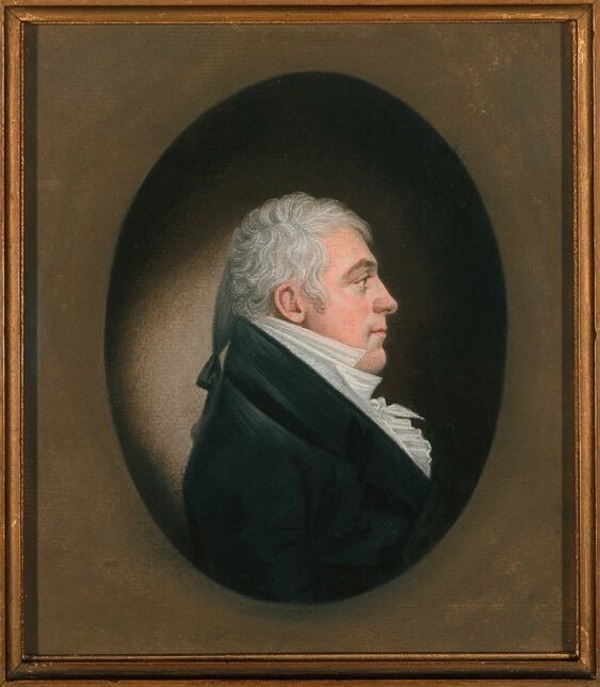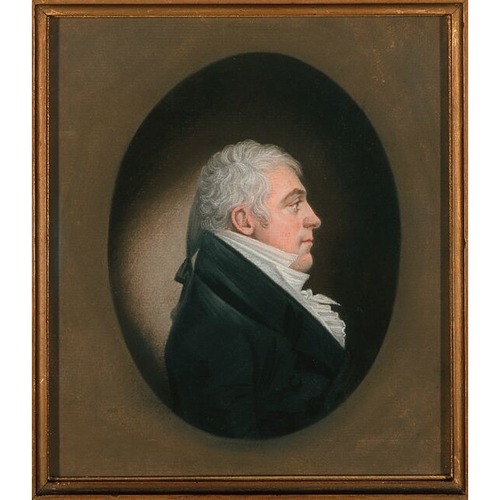
Source: Link
CHABOILLEZ, CHARLES, fur trader; b. 21 March 1772 in Montreal, Que., son of Charles-Jean-Baptiste Chaboillez and Marguerite Larchevêque; m. 11 Jan. 1811 Jessy Bruce, aged 19, in the Cathedral of the Holy Trinity at Quebec, Lower Canada; d. 26 Dec. 1812 in Mascouche, Lower Canada, and was buried three days later in the cemetery of the parish of Saint-Louis at nearby Terrebonne.
Charles Chaboillez entered the Collège Saint-Raphaël in Montreal in 1783; founded in 1767 by the Sulpicians, this institution had been attended by men such as Antoine Tabeau and Jean-Baptiste Cadot Jr who later became voyageurs. It is not known whether Chaboillez was a pupil there for more than a year or whether he enrolled elsewhere to learn arithmetic and English. On 18 May 1791 he was hired for a four-year period by Joseph Frobisher to work as a clerk in the North West Company for the sum of £25 and a new outfit of clothes. At the end of his contract he remained in the company’s service. After spending the winter of 1795–96 at Île-à-la-Crosse (Sask.), he headed east for Cumberland House (Sask.), which he reached on 1 June 1796.
As the son of a fur trader with a solid reputation and the brother-in-law of Simon McTavish, Chaboillez was in a good position to carve a place for himself in the NWC; the experience he had acquired as a company clerk in a territory where competition was keen also worked in his favour. On 13 July 1796, at Grand Portage (near Grand Portage, Minn.), he signed the agreement drawn up on 30 October of the previous year that altered the composition of the company. This convention, which was not to come into effect until the spring of 1799, granted him one of the 46 shares in the enterprise.
Having signed the agreement, Chaboillez participated in the NWC’s expansion northwest of the Great Lakes. Beginning in 1796 he was assigned to the Red and Assiniboine river region, where he had to compete with American merchants. According to the explorer David Thompson*, he built a post on the Rat River, a tributary of the Red. When Thompson met him the following year, Chaboillez was established farther south, near the Pembina River. The journal which he kept of his activities from 4 Aug. 1797 to 21 June 1798 gives numerous details about the fur trade and its conduct. In 1799 he became proprietor of the Lower Red River department and had under his orders a young clerk, Alexander Henry.
While he was in charge of the Fort Dauphin department, from 1804 to 1807, Chaboillez tried to open up a new area for trade in the upper reaches of the Missouri River. In 1804 he organized the first expedition, entrusting its leadership to the clerk François-Antoine Larocque*. Larocque, who was accompanied by Charles McKenzie* among others, went to the country of the Mandans with the objective of establishing trading links with them. The following year Larocque travelled close to the Rockies, to the great displeasure of the Mandans and the Gros Ventres (Hidatsa); the latter were afraid that they would lose their position as middlemen if the NWC made direct contact with the Crows in that region. On 18 Nov. 1805 Larocque was back and expressed himself somewhat disappointed with the results of the expedition. The following summer Chaboillez, accompanied by Alexander Henry, visited the Mandans and the Fall Indians. According to reports by McKenzie and James Caldwell, the Indians were not very impressed with the rather slovenly appearance of the two company partners. The limited success of these expeditions obliged the NWC to put an end to them.
At the annual meeting in 1807 the company made Chaboillez proprietor at Fort Pic, north of Lake Superior. When he went to Fort William (Thunder Bay, Ont.) in 1809, he had to answer serious charges concerning his last financial period. The meeting decided to wait until all the evidence was in hand before making its decision. However, it is impossible to find out more about the matter, since the minutes of subsequent meetings make no further mention of it.
It was probably on this occasion that Chaboillez, who was 37, decided to retire from the fur trade, although he maintained his relations with a few of the partners of the NWC such as his brother-in-law Roderick McKenzie* and David Thompson. He remained briefly in Montreal before taking up permanent residence at Terrebonne around 1810. Here on 3 Feb. 1811 he had his four natural children baptized; born in the west, they were then from 6 to 11 years of age. When he died in 1812 he left £1,050 to three of these children, £120 to relatives and friends, and sole ownership of the remainder of his property to his wife, including an annual income of £120 from a capital of £2,000.
Coming from a family that had been closely involved in the fur trade, Chaboillez had been drawn into it by the age of 19. First as a clerk and then as a partner in the NWC, he was not afraid to face competition with rival enterprises or to use means such as intimidation and rum. He regularly attended the annual meetings of the company, and from 1809 was a member of the Beaver Club. His relations with the chief partners of the NWC were sufficiently good for him to avoid officially the fate of Jean-Baptiste Cadot Jr, a partner who was expelled in 1804 for “drunkenness and riotousness.”
The journal Charles Chaboillez wrote in 1797 and 1798 is at PAC, MG 19, C1, 1.
AC, Terrebonne (Saint-Jérôme), État civil, Catholiques, Saint-Louis (Terrebonne), 29 déc. 1812. ANQ-M, CE1-51, 21 mars 1772; CM1, Charles Chaboillez, 12 févr. 1813; CN1-29, 18 mai 1791. ANQ-Q, CE1-61, 11 janv. 1811; CN1-285, 8 janv. 1811. Les bourgeois de la Compagnie du Nord-Ouest (Masson). Docs. relating to NWC (Wallace). Five fur traders of the northwest . . . , ed. C. M. Gates ([Minneapolis, Minn.], 1933), 141, 158, 170–71. D. W. Harmon, Journal of voyages and travels in the interior of North America between the 47th and 58th degrees of N. lat., extending from Montreal nearly to the Pacific . . . , ed. W. L. Grant (2nd ed., Toronto, 1911), 98–109, 124–27. [F.-A. Larocque], Journal de Larocque de la rivière Assiniboine jusqu’à la rivière “Aux Roches Jaunes,” 1805, ed. L. J. Burpee (Ottawa, 1911). Mackenzie, Journals and letters (Lamb), 459, 479–80, 483–85, 496. [David Thompson], David Thompson’s narrative, 1784–1812, ed. R. [G.] Glover (new ed., Toronto, 1962). Raymond Masson, Généalogie des familles de Terrebonne (4v., Montréal, 1930–31), 1: 387–90. A.-G. Morice, Dictionnaire historique des Canadiens et des Métis français de l’Ouest (Québec et Montréal, 1908). M. W. Campbell, NWC (1957), 77, 117–18. Innis, Fur trade in Canada (1970). Morton, Hist. of Canadian west. Rumilly, La Compagnie du Nord-Ouest. Massicotte, “Les Chaboillez,” BRH, 28: 184–88, 207–9, 241–42, 274–76, 311–13, 325–32, 355–59. E. A. Mitchell, “The North West Company agreement of 1795,” CHR, 36 (1955): 126–45.
Cite This Article
Gratien Allaire, “CHABOILLEZ, CHARLES (1772-1812),” in Dictionary of Canadian Biography, vol. 5, University of Toronto/Université Laval, 2003–, accessed November 6, 2025, https://www.biographi.ca/en/bio/chaboillez_charles_5E.html.
The citation above shows the format for footnotes and endnotes according to the Chicago manual of style (16th edition). Information to be used in other citation formats:
| Permalink: | https://www.biographi.ca/en/bio/chaboillez_charles_5E.html |
| Author of Article: | Gratien Allaire |
| Title of Article: | CHABOILLEZ, CHARLES (1772-1812) |
| Publication Name: | Dictionary of Canadian Biography, vol. 5 |
| Publisher: | University of Toronto/Université Laval |
| Year of revision: | 1983 |
| Access Date: | November 6, 2025 |



